THE THOUGHT OF ALDOUS HUXLEY
 M. M KIRKWOOD
M. M KIRKWOOD
IN an article which appeared in the Lo n don Mercury of January, 1933, G. K . Che st erton placed Huxley among the young moderns whom he attacked as "witty, brilliant and fashionable bankrupts." This view of Huxley in particular has been a common one, for brilliance and wit animate whatever he writes , and, having written for a world that wanted to be amu sed , he has become fashionable. Mr . understood him merely to mock, as one having no religious belief and seeing no purpose in the world or in the will. Whether this be a real aspe.ct of his work or not, reader s have not found it easy to resist a writer who remarks in connection wi th one of his characters that "no chameleon can live with comfort on a tartan," and who concludes his description of his own agonie,s during a first ride on an elephant with the comment, "I returned full of admiration for Hannibal. He crosse d the Alps on an elephant." Numerous quips by Huxley include the statement that "Puritans like to wear the fig - leaf over the mouth," while in a serious essay on the evolution of theologies, he uses the astonis h ing figure, "Men's religious life works on the principle of a hot-water system ." Huxley's voca bulary is no less en tertaining than his figures of coml?arison, and we find ourselves stimulated if not always illuminated by "minusculous" and "callipygous," "wamblingly" and "bombinating," "geodesic" and "mixoIydian." It is as if the creator of "brillig" and "slithy toves" had come to life again, challenging us to understand as well as to enjoy him.
Entertainment has, however , been the most frequen t aim for readers of Huxley, who have gone to the novels
189
THE UNIVERSITY OF TORONTO QUARTERLY
for the flavour and veri table appearance of con temporary existence. In these, with the exception of the last, Eyeless in Gaza (1936), it is common to notice chiefly the verbal scintillation, the acute observation, and the high spirits combined with devastating pessimism. For those readers, on the other hand, who know the poems, and the essays (On the Margin, 1923, Jesting Pilate, 1926, Do What You Will, 1929, and Music at Night, 1931), t he keenest pleasure in reading Huxley has been derived from recognizing the critical acumen behind the jest, the wisdom beneath the wit. He is not only an artist absorbed in his work, but (in spite of his animadversions against his maternal grandfather) a thinker whose whole work is marked by high seriousness . For half a generation his verbal fireworks have distracted attention from this fact; but in his last novel h e drops his pyrotechnics in face of the blaze of unity covering separation ("Unity of mankind, unity of all life, all being even," he writes), and speaks plainly to the reader. In spite of our interest in this exposition of a new mysticism based on science, we are a little shocked-as who might say, "Is Saul also among the prophets 1" And yet, as early as in Little Mexican (1924), Huxley himself said, "Now it is possible-it is, indeed, almost necessary-for a man of science to be also a mystic."
I t is characteristic, then, that Huxley should describe Anthony Beavis, in Eyeless in Gaza, as converted to the mystic theory elaborated in the last pages of that novel, by the observations of an anthropologist. The marvels of scien tific fact, particularly of biological fact, fascinate this grandchild of Darwin's bull-dog. There are innumerable passages in his work to remind the reader of his scientific heritage. In Mortal Coils (1922), he makes the old boy of The Tillotson Banquet say, "Life to come.
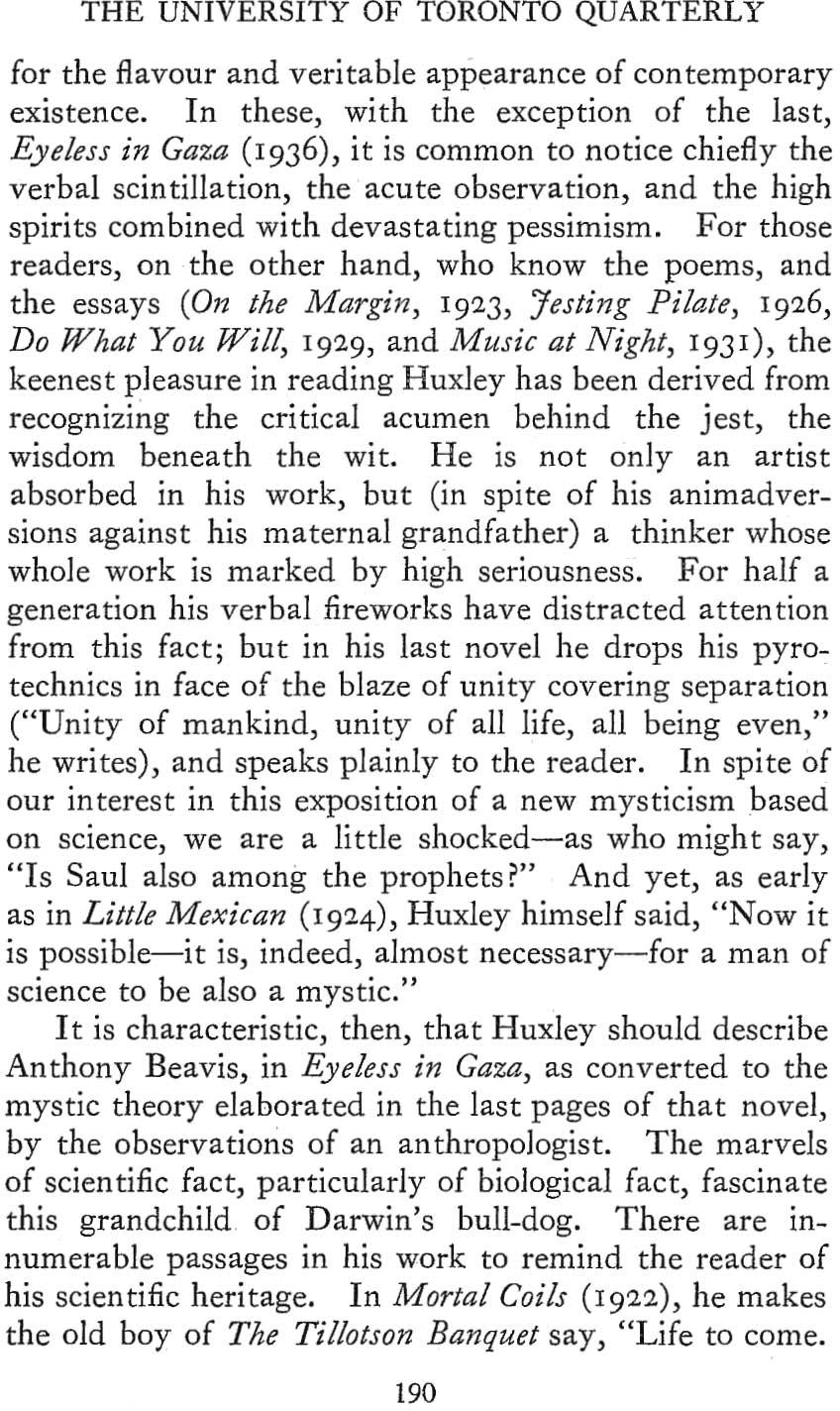
190

THE THOUGHT "OF ALDOUS HUXLEY
No, I don't believe in any of that stuff- not since 1859. The Origin oj Species changed my views, you know. No life to come for me, thank you . You don't remember the excitement of course. You're very young, Mr. Spode." Many readers will remember striking passages in Point Counter Point (1928), where Huxley's accounts of chemical and physical change are shown in ironic juxtaposition to " the observed mental and emotional experience of his characters, while others will have noted in Eyeless in Gaza the extraordinary description of the fertilization of the cell as seen under the microscope. Not so many readers know the poetic transcription of life's chemistry (or "The Cycle of Nutriment in the Natural World" as it might be called), which is found in The Cicadas (1931), or the following passage from Little Mexican:
What an itch we have to know whether Mr. Smith makes love to his secretary. And meanwhile the most incredible miracles are happ e ning all round u s : stones, when we lift them and let them go, fall to the ground; the s un shines; bees visit the flowers; seeds grow into plants ; a cell in nine months multiplie s its weight a few thousands of thou sa nd s of times, and is a child; and men think, creating the world they live in. These things leave us almo s t perfectly indifferent.
Repetitive, impassioned, and unconcerned, Huxley has thus for years poured his energy in to bringing the incredible miracles of physics, chemistry, biology, and other sciences before his reader's eyes. But admiration is not his only motive, nor enlightenment his only aim. He wishes to say, "These things you should see. These things you should know . But you cannot know all. There is no knowledge in the absolute sense. Man's only wisdom is an open mind " In other words, his fii-st philosophic purpose is to teach scepticism, just as clearly
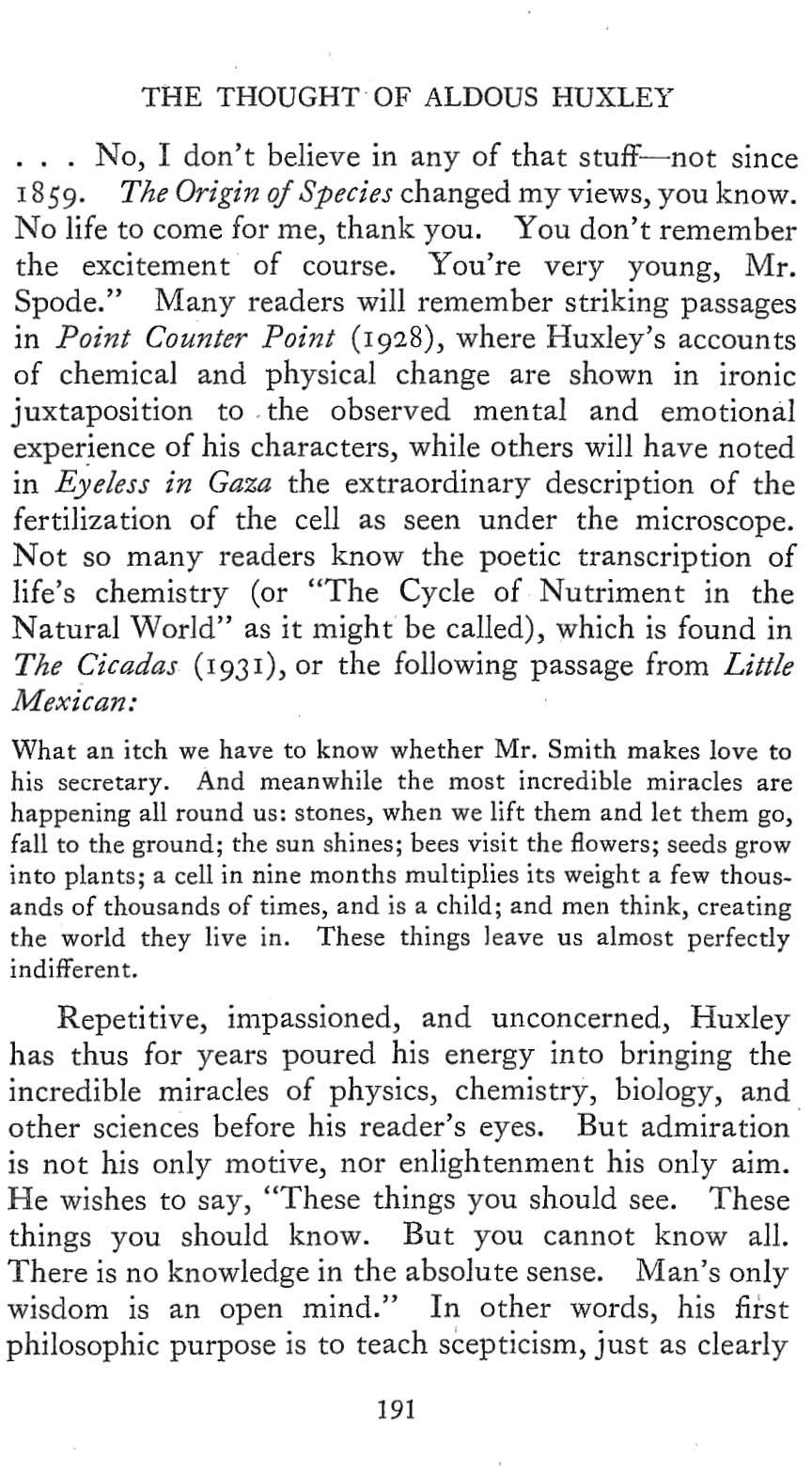

191
THE UNIVERSITY OF TORONTO QUARTERLY

as his first aesthetic purpose is to eX£ress love of existence. We find, for example, in the collection of essays Along the Road (1928), the statement: "We have learned that nothing is simple and rational except what we ourselves have invented, ... that science has 'explained' nothing." He writes in Proper Studies (1927), "Where knowledge is absent-and in an ab s olute sense we can know nothinga vague working hypothesis is quite enough for all practical and even ' philosophical purposes." And in Do What You Will (1929), there is the clear pronouncement about science, that it "tells us nothing about the real nature of the world ." These statements, which indeed represent a basic element in his thought, form the c1ilef ground for the cri tic who sees in Aldous Huxley a mental and moral bankrupt . Science has led him to wonder at the world, but has convinced him that it cannot be understood . He is in other words a true child of Hume, a thoroughgoing rationalist and sceptic . The interesting question is whether his thought may not contain some stress or substance which carrie s him beyond Hume-although Chesterton would have said that he went beyond Hume only in negativeness and iconoclasm.
Certainly Huxley's use of natural science, and of psychology in particular, tends to disillu s ionment in the casual reader. Li ttle else could be expected from a writer who says frankly (in Do What You Will), "Truth is internal. One psychological fact is as good as another." In his imaginative work, and in his essays, Huxley acts in accordance with this psychological indifferentism, and the results, if sometimes repellent to the taste, do open vistas of actuality before the reader which render untenable for the future the false and blind idealism loosely held by many. Huxley has, for example, brought home to some roman tic people the perception that "What we

192
THE THOUGHT OF ALDOUS HUXLEY
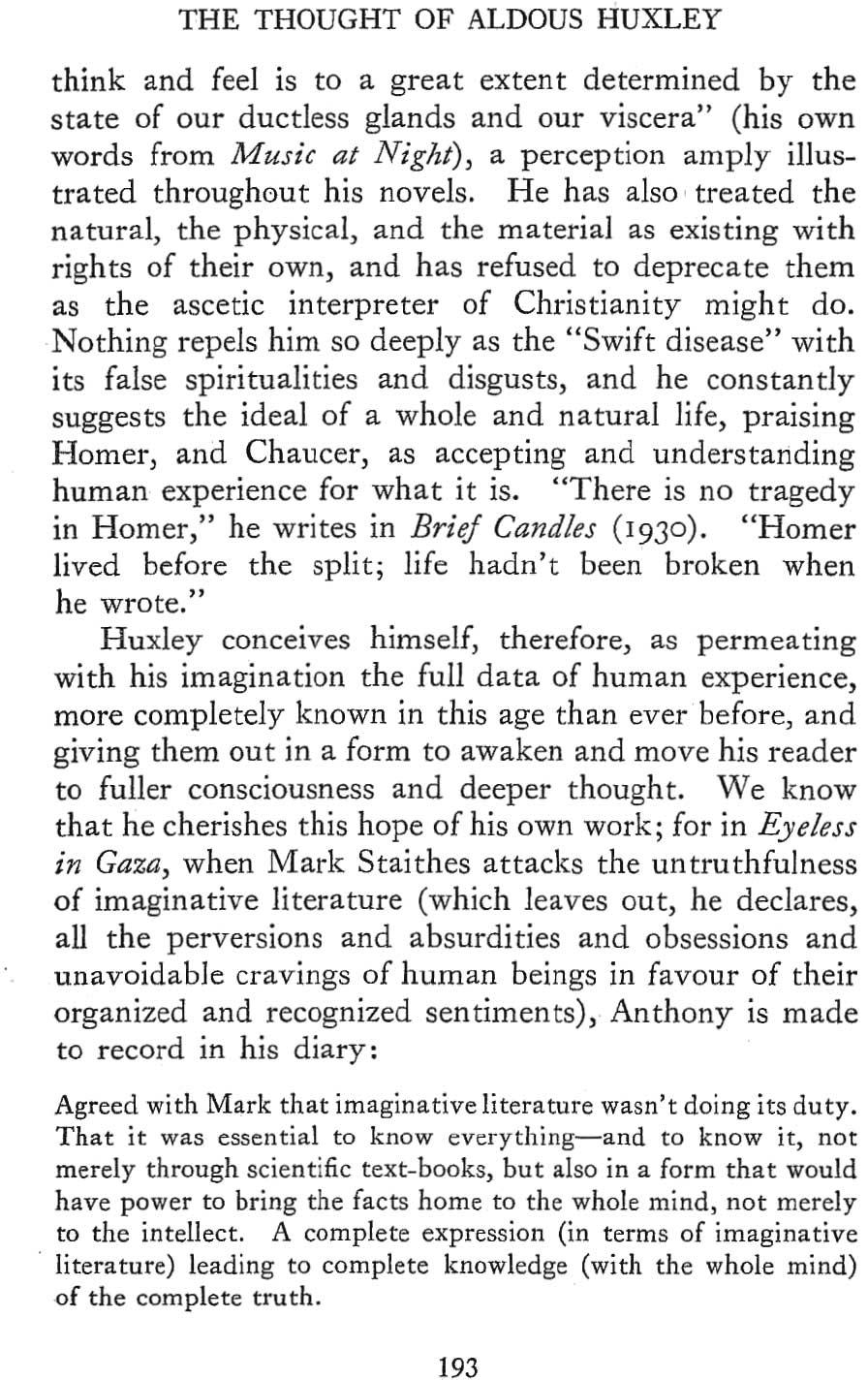
think and feel is t o a great exten t determined by the state of our ductless glands and our viscera" (his own words from Music at Night), a perception amply illustrated throughout his novels. He has also , treated the natural, the physical, and the material as existing with rights of their own, and has refused to deprecate them as the ascetic interpreter of Christianity might do. Nothing repels him so deeply as the "Swift disease" with its false spiritualities and disgusts, and he constantly suggests the ideal of a whole and natural life, praising Homer, and Chaucer, as accepting and understanding human experience for what it is. "There is no tragedy in Homer," he writes in Brief Candles ( 193 0) . "Homer lived before the sp lit; life hadn' t been broken when he wrote."
Huxley conceives himself, therefore, as permeating with his imagination the full data of human experience, more completely known in this age than ever before, and giving them out in a form to awaken and move his reader to fuller consciousness and deeper t hought . We know that he cherishes this hope of his own work; for in Eyeless i n Gaza, when Mark Staithes attacks the untruthfulness of imaginative literature (w hich leaves out, he declares, all the perversions and absu rditie s and obsessions and unavoidable cravings of human beings in favour of their organized and recognized sentiments), Anthony is made to reco rd in hi s diary:
Agreed with Mark that imaginative literature wasn't doing its duty. That it was essentia l to know everything-and to know it, not merel y through scientific text-books, but also in a fo rm that would hav e power to bring the facts home to the whole mind, not merely to the intellect. A complete expression (in terms of imaginative . literature) leading to complete knowledge (with the whole mind) of the complete truth .
193
THE UNIVERSITY OF TORONTO QUARTJ;:RLY
Here Huxley become s his own apologist aga inst those who regard him as a mere muck-raker, or eve n a mere ironist. He has the ironic gift of seeing life on two levels, it is true, but the sensual and natural are far from being his main pre-occupati on, as certain commentators have suggested. He is often fiercely frank lest he and the readers may let themselves off too easily, and leave the picture of themselves and their world more pleas an t than the facts warrant. But when the picture is complete and devastating, what then? Again in his last book, and in the paragraph already quoted from, Huxley is quite explicit about his ultimate aim. The imaginative treatment of life in its present actuality is the indispensable preliminary condition of any rem edia l action, any se rious attempt at the construction of a genuinely human being. Con struction from within by training in proper u se of the selftrainin g, simultaneously physical and mental. Construction, at the same time, from without, by means of social and economic arrangements devised in th e li g ht of a complete knowledge of the individual, and of the way in which the individual ca n modify him se lf.
These words poin t sharply the hilarious irony of his Brave' New World (1932), and must close once for all the lips of his accusers.
For the Huxley of 1936 is confessedly an ethical philosopher, interested in the ethics of society as well as of the Individual. Both trends have been evident in his work for some A rationalist, he starts his considerations by recognizing that right and wrong are a matter of the age and time concerned. "Morality is the theory of pre-existing social habits," he writes in Jesting Pilate . "Civi li za tion is nothing but a series of conventions." H e realizes that the earliest conventio ns hav e been determined by the struggle for survival, and that
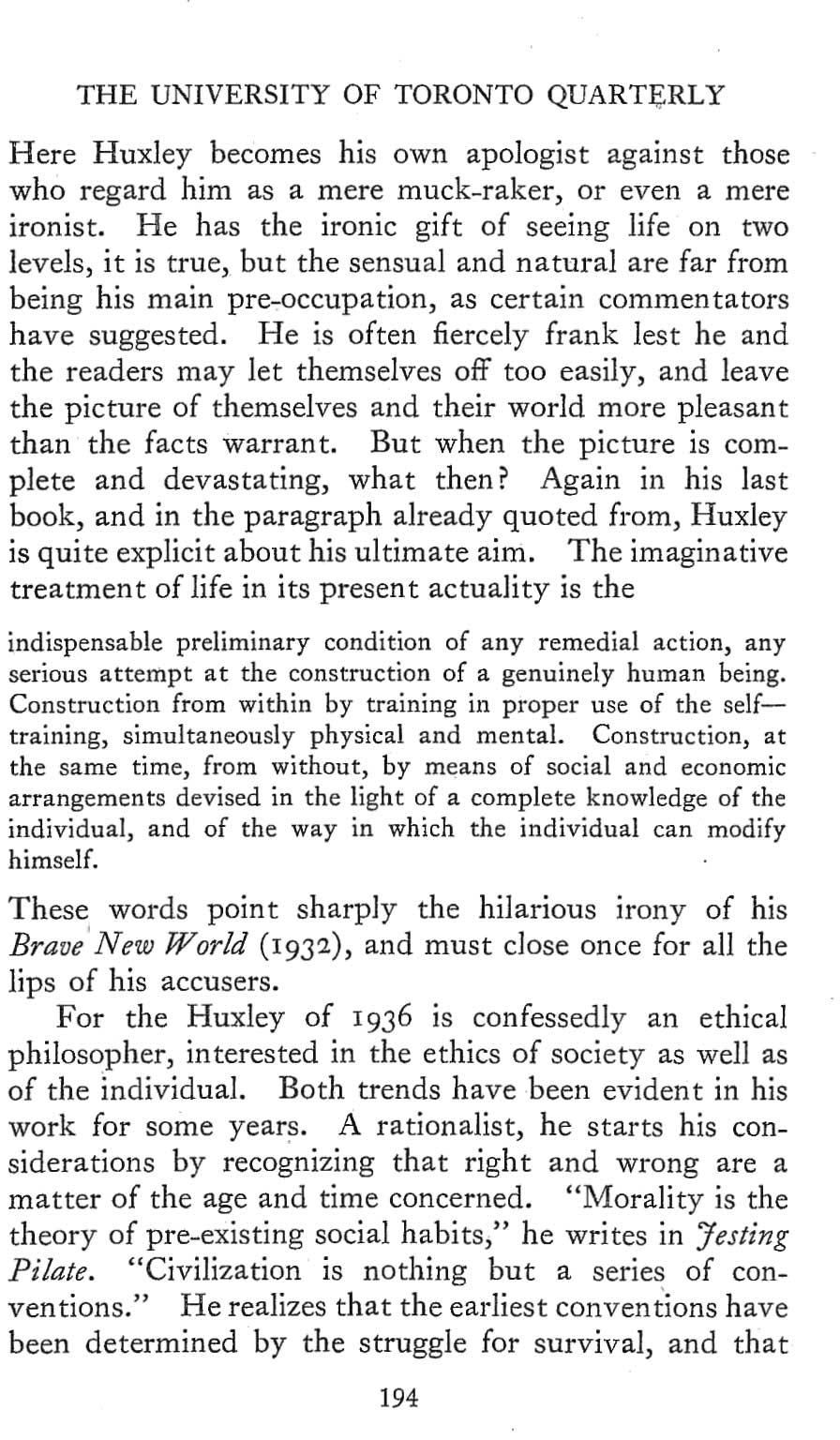

194
THE THOUGHT OF ALDOUS HUXLEY
for long periods society h as been the real, and the individual only a poten tial, uni t. Because the prese n t European world is a post-war world, it tends to Fascism and supernationalism, which means that the type of individual cultivated by authority is moulded chiefly with reference to national survival. This contradicts, for Huxley, the whole po int and meaning of civilization, which means to him the high humane values represented in the lives of the individuals making up that civilization. We get our values from the past, it is true, but liberty itself is one of those values and should be cherished, while a too rigid holding by the past should be resisted. So morality means first a balancing of the claims of society and individual. Huxley believes that no acute dilemma will be felt as long as attention is focussed on concrete peop le. For in this way, as he writes in Eyeless in Gaza, you see at once that fr eedom from coercion is a necessary condition of their developing into full-grown human being s ; that the form of economic prosperity which consists in possessing unn ecessa ry objects doesn't make for individ ual well-being; that a leisu re filled with passive amusements is not a bl essing ; that the conveniences of urb an life are bought at a high physiological and mental price; that an education which allows yo u to use yourself wrongly is almost valueless; that a social organization resu l ting in individuals being forced, every few years, to go out and murder one another mllst be wrong. And $0 on.
To this quotation might be added numerou s other comments on the politica l problems of our time. Hux ley's radical sympathies do not blind him to the folly of a too confident democracy, nor do his aristocratic tastes and training prevent him from just consideration for the rights of all men. After visiting India , he wrote in 'Jesting Pilate, "One is all for religion until one visits a really religious country. There, one is all for drains, machinery and the minimum wage." The following year (1927) he 195
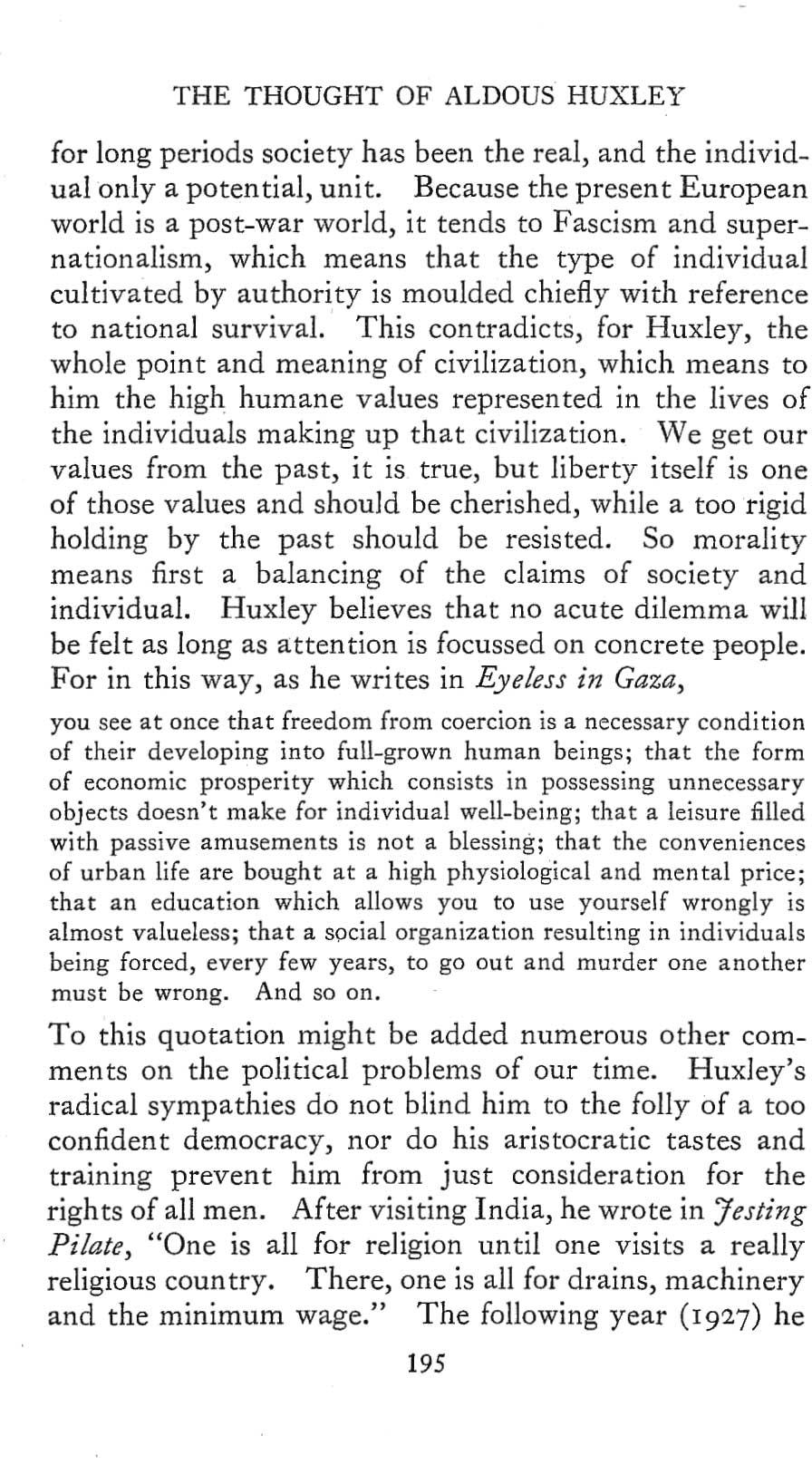

THE UNIVERSITY OF TORONTO QUARTERLY
wrote in P"oper Studies, "That every human being should be in his place-this is the ideal of the aristocratic as opposed to the democratic state," a say in g pregnant with wisdom if hardl y original!
It is when he writes of the individual human being, his drives and impulses, his propensity to though t and capacity for contemplation, his conflicts, his duty and happiness, that Huxley is most illuminating. He is well aware that his naturalism may be mis-read, and so makes himself very clear as to the end of the whole matter. Man is not just the creature of his physical impul ses, no t ju st the v ictim of arbitrary conditioning, not just the passive spectator in an alien world, but a consc io us, creative, discriminating being who not only feel s and enjoys but "t hink s, creating the world he Jives in," experiences the categorical imperative (a phrase he jests at, it is true), judges, and makes and applies ever new standards and values. In On the Margin there is an in teresting passage:
Everything that Wren did was the work of a gentleman: one who valued dignity and restraint and who, respecting himself, respected also hu manity; one who desired that men and women should Jiv e with th e dignity, even the grandeur befitting their proud human title; one who despised meanness and oddity as much as vulgar ostentation; one who admired reason and order, who d i strusted a ll extravagance and excess.
And a little further on: "For practical purposes and in a civilized, orderly society, the gentleman remains, after all, the ideal man." These extracts should be read in conjunction wit h his discussions as to the ends of life, which are carried on in 'jesting Pilate. He there writes, "Man is here on earth to advert ture, to know, to try all things, to advance (if on ly for the fun of advancing, of not standing still) towards some quite unattainable goal
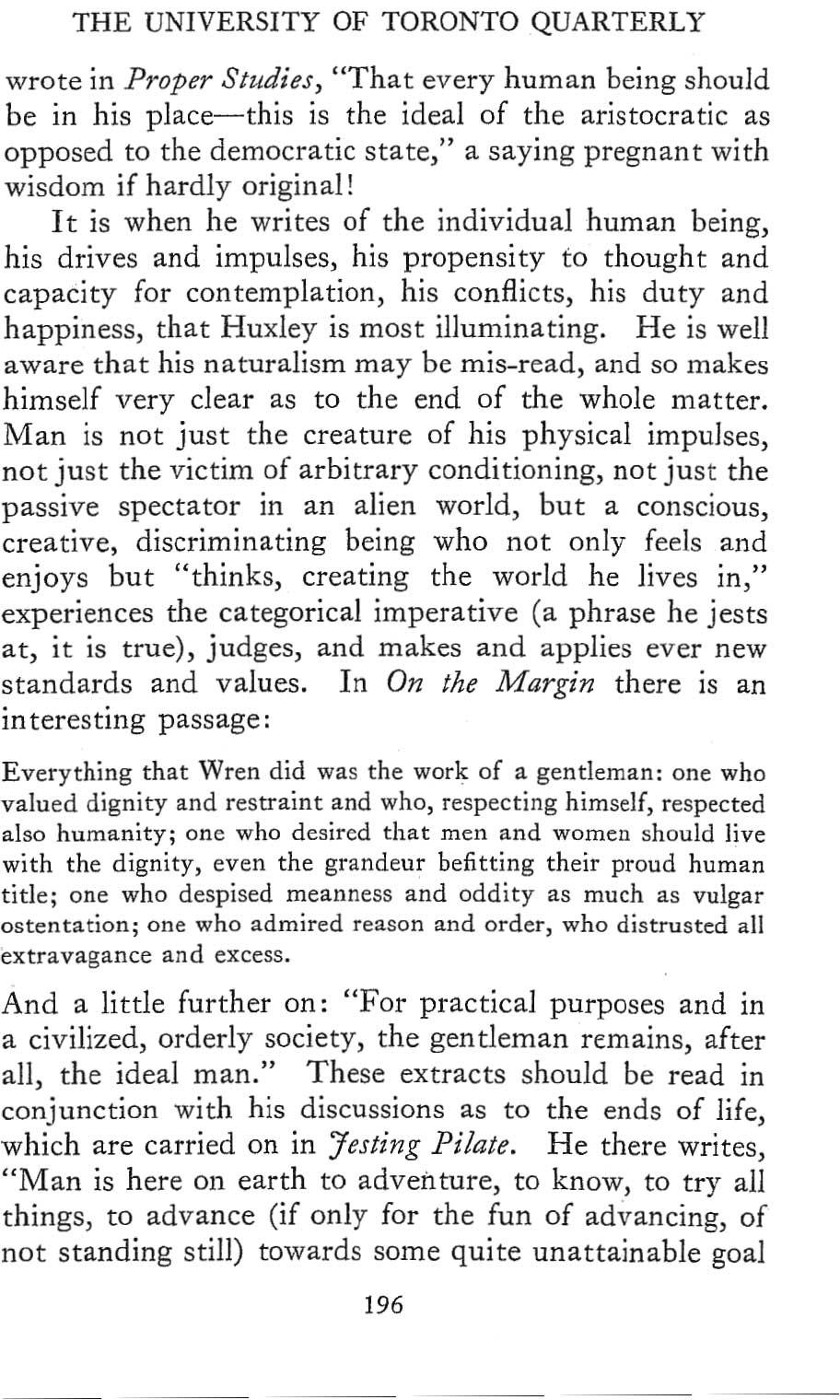
196
THE THOUGHT OF ALDOUS HUXLEY
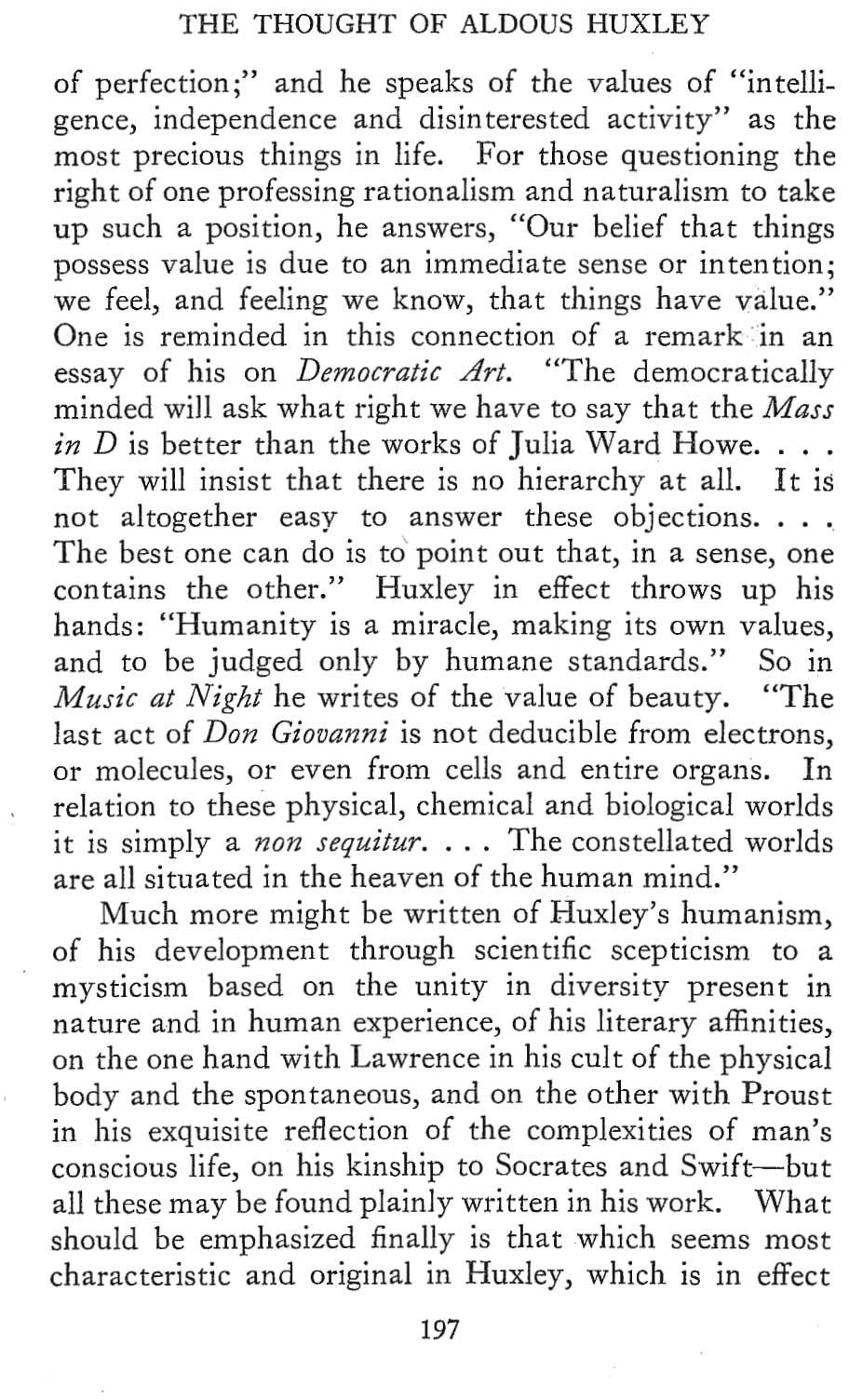
of perfection;" and he speaks of the values of "in telligence, independence and disin teres ted activity" as the most precious things in life. For those questioning the right of one professing rationalism and naturalism to take up such a position, he answers, "Our belief that things possess value is due to an immediate sense or in ten tion; we feel, and feeling we know, that things have value." One is reminded in this connection of a remark in an essay of his on Democratic Art. "The democratically minded will ask what right we have to say that the Mass in D is better than the works of Julia Ward Howe . . .. They will insist that there is no hierarchy at all. It is not altogether easy to answer these objections... . The best one can do is to point out that, in a sense, one contains the other." Huxley in effect throws up his hands: "Humanity is a miracle, making its own values, and to be judged only by humane standards." So in Music at Night he writes of the value of beauty. "The last act of Don Giovanni is not deducible from electrons, or molecules, or even from cells and en tire organs. In rela tion to thes"e physical, chemical and biological worlds it is simply a non sequitur . . . . The con stella ted worlds are all situated in the heaven of the human mind . "
Much more might be written of Huxley's humanism, of his development through sci en tific scepticism to a mysticism based on the unity in diversity present in nature and in human experience, of his literary affinities, on the one hand with Lawrence in his cult of the physical body and the spontaneous, and on the other with Proust in his exquisite reflection of the complexities of man's conscious life, on his kinship to Socrates and Swift-but all these may be found plainly written in his work. What should be emphasized finally is that which seems most characteristic and original in Huxley, which is in effect 197
THE UNIVERSITY OF TORONTO QUARTERLY
all-pervasive and a most necessary mess age for his age. This is the clear recognition of man's full responsibility for his life, which has come to Huxley as the human and ethical implication of the sc ientific discoveries of the last three generations. Rampion is made Huxley's mouthpiece in Point Counter Point: "A man is a creature on a tight rope .... The only absolute he can ever know is the absolute of perfect balance." Miller, in Eyeless in Gaza, is also made to say: "Not that anything ever happens by chance, of course . One takes the card the conjurer forces on one-the card which one has oneself made it inevitable that he should force on one. It' s a matter of cause and effect . " These are but the logical development of earlier dicta found in Do What You Will. "The on ly thing in our power is to do our best to be men, here and now," he wrote. "The purpose of life ... is the purpose we put into it." And so Huxley leaves us, having robbed us of the overruling benevolence of God and the machinations of fate, and having put on us the task of building and ever re-building the religion, the very God, by which we may be able to live.
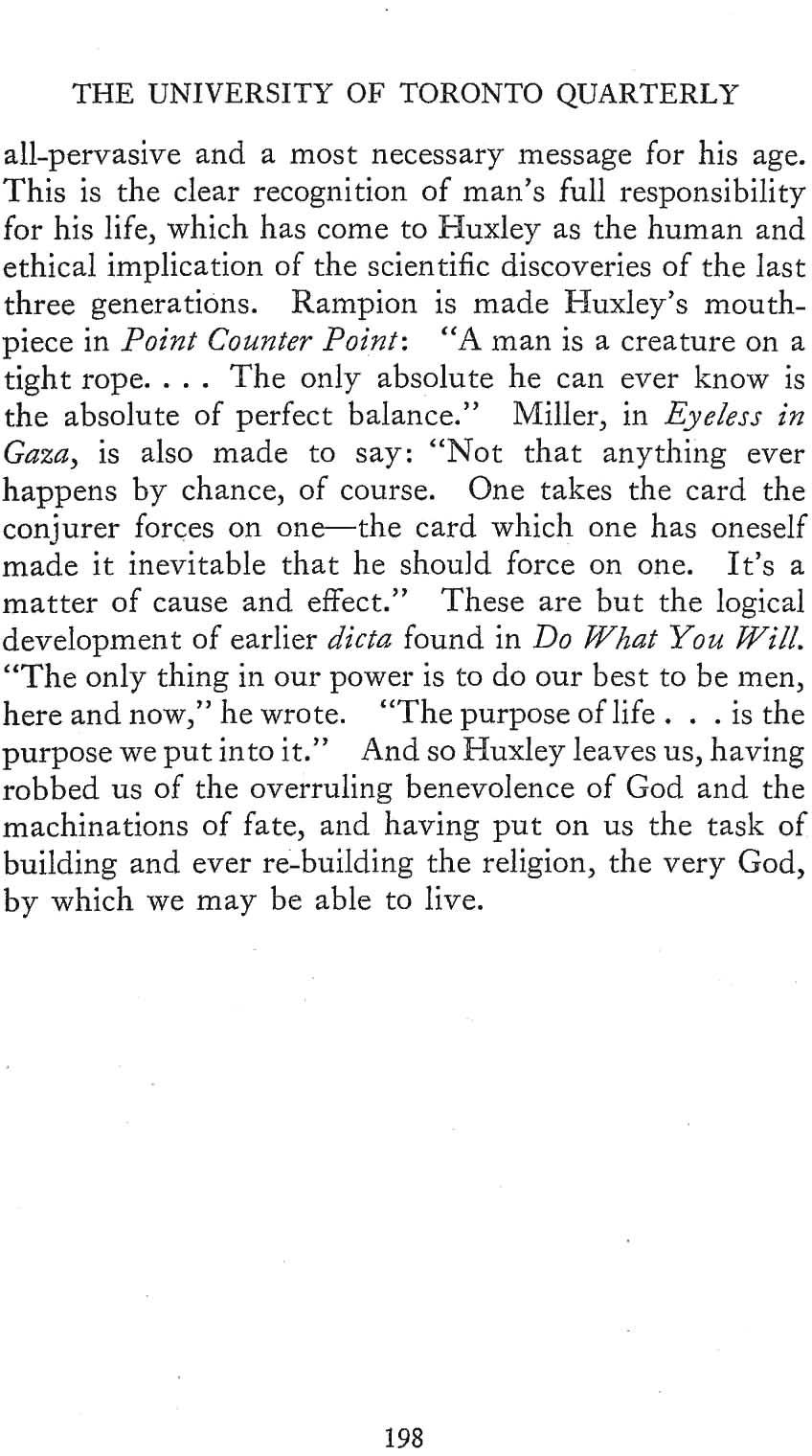
198
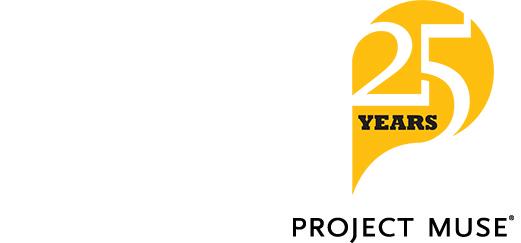
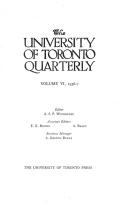

 M. M KIRKWOOD
M. M KIRKWOOD













